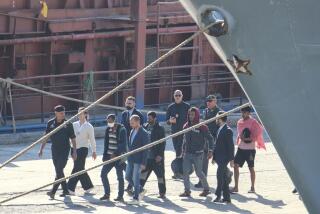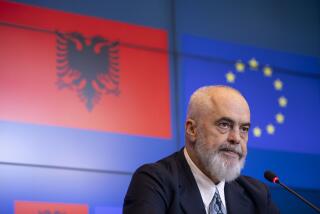Kosovo Refugees Face Misery, Death on Trip to Albania
- Share via
KUKES, Albania — They continued to come on foot and in slow-moving farm carts Friday, an uninterrupted tide of refugees that seemed to grow stronger from hour to hour.
And, as though days on the road without food or water was not bad enough for these ethnic Albanians, some were arriving with fresh wounds from shellings, or saying they had been raped, beaten or robbed by their Serbian tormentors along the way.
More than 30,000 new refugees poured into this stretched and desperate border city--the largest one-day influx since the mass deportation of ethnic Albanians from Kosovo last week. They filled up the Kukes city square and wandered wearily though its streets in search of dry places to sleep.
By nightfall, Albania’s one-week refugee total was 150,000--in a country of only 3.5 million that is already one of the poorest in Europe.
The small contingent of humanitarian workers here said they do not have nearly enough resources to provide adequate sanitation, food, water, transport and shelter. A new problem is that the Yugoslav authorities had begun to force refugees out of the Serbian province of Kosovo at a new border crossing that is even harder for rescue workers to reach.
“This is a logistical nightmare,” said Laura Boldrini of the Office of the U.N. High Commissioner for Refugees. If the remaining people already displaced within Kosovo are deported by the Serbs in coming days, she said, “I don’t know how we will cope.”
In what may be a harbinger of tragedies to come, a police commander at the main border crossing said six infants or small children died during the night from the cold, exhaustion and lack of water as they entered Albania.
Refugees told wrenching tales of children being beaten to force their parents to hand over money to Serbian police, and of young men being taken away as their families pleaded in vain to save them.
But there were also cases of compelling courage and generosity, such as when Festim Krasnic, 18, carried his 14-year-old brother, Milaim, on his back for five hours to reach the border and then gave Milaim a friendly smile as he set him down on the Albanian side. Milaim, who weighs about 90 pounds, had lost one leg in a shelling incident six months ago.
In Kukes, a city of 20,000 that has become the staging area for the relief effort, the refugee population grew faster than the available room aboard trucks and buses to carry them to a more suitable location on Albania’s coastal plain.
As a result of the bottleneck in transportation, there were more than 60,000 people camped in and around the town 12 miles from the border, exposed here in the mountains to rain and cold. Already, parts of the town have begun to smell like a public toilet. And police had to step in to prevent a riot when a bus was being loaded to take some refugees to Tirana, the capital.
“The situation here is getting out of control,” said Jonuz Kola, who heads the office registering refugees. “We have done all we could. . . . We must have foreign assistance.”
Izmet Doda, 54, arrived in a cart, his head cradled on the lap of his sobbing wife. He had been seriously wounded in the back by Serbian shelling at 1 a.m. Friday, she said. A neighbor said about a dozen members of one family died in the same attack on the village of Nagavac, in southern Kosovo, while others spoke of 100 dead.
“They completely destroyed the village,” said Shkelzen Maleson, 32. “The houses were destroyed and we saw bodies in the rubble.”
“I saw with my own eyes about 50 people killed,” said Bulbul Bereza, 36, who arrived Friday from Brestovac. “I am convinced that there are thousands massacred in the region.”
Although such claims cannot be confirmed, there was little need to question the emotional anguish displayed by the refugees once they crossed the border.
Sahit Zogay, 67, a farmer who was red-eyed from crying, sought out reporters to tell them the Serbs had taken away three of his sons and two grandsons on the road.
“I was begging the police. I said there was no need to take them--we were going to Albania,” Zogay explained. “I gave them everything they wanted, all my money.”
Korab Bajraktri, 38, commander of the Albanian border police near Kukes, said he had no words for the Serbian police committing such offenses against unarmed civilians.
“Some of them are animals, not human,” he said. “They raped about six girls last night. They rape first, then send them over.”
More to Read
Sign up for Essential California
The most important California stories and recommendations in your inbox every morning.
You may occasionally receive promotional content from the Los Angeles Times.













